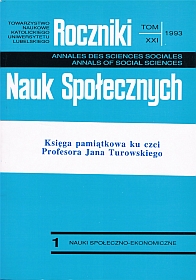Sytuacja polskiej ludności w Austrii: pomiędzy diasporą a alienacją
Abstrakt
In 1990 the number of Poles in Austria could be estimated as follows: about 12,000 people with Polish passports and with convention documents (who have been granted political asylum); about 25,000 people with Austrian passports but speaking Polish; about 45,000 people who already do not speak Polish or whose Polish is very poor but who are conscious of their Polish background and who maintain some kind of relations with Polish culture.
In Austria two tendencies are observed towards Poles as well as towards other foreigners: motivating the mechanisms that stop the influx of Poles to Austria and accelerating the integration of those Poles who already live in Austria.
Poles do not live in big groups but they are scattered among the natives; nevertheless they maintain fairly lively family and social bonds with each other. They are deeply rooted in Polish culture. They have a strong sense of having bonds with Poland. They uphold the fundamental values of Polish culture. In their family life they maintain observing the basic Polish traditions and holidays. And yet they are also open to the Austrian society and its culture. They want to live in the Austrian society and they perceive it as their children's society.
Poles' entrance into the Austrian society is conditioned by many factors, the foremost of them being the law determining their economic, cultural, social and political position as well as the society's attitude towards them as foreigners. The law is the most important hindrance to Poles' entrance to the structures of the Austrian society. There are many regulations, and even more ways of handling matters that do not permit Poles to be treated on an equal footing with the natives, even when they live among them for many years and they have friendly relations with them both in the private and professional spheres. The point is then that they are relatively easily integrated with the Austrian society in the sphere of private life but they are alienated in the sphere of public life. They remain in a sort of intermediate state: between the state of diaspora and that of alienation. This is a difficult situation. It can be changed by accepting the model of cultural pluralism in the Austrian internal policy. Putting this model into effect postulates granting the Polish population in Austria the rights of an ethnic minority. This would guarantee Poles keeping their own culture and a creative life in the Austrian society, i.e. forming the society together with the natives − which means complete integration with it.
Copyright (c) 1993 Roczniki Nauk Społecznych

Utwór dostępny jest na licencji Creative Commons Uznanie autorstwa – Użycie niekomercyjne – Bez utworów zależnych 4.0 Międzynarodowe.


